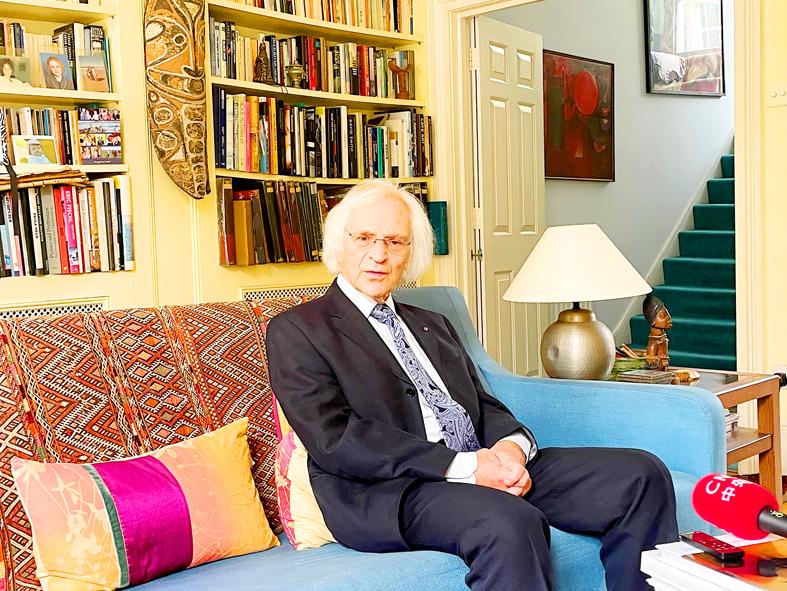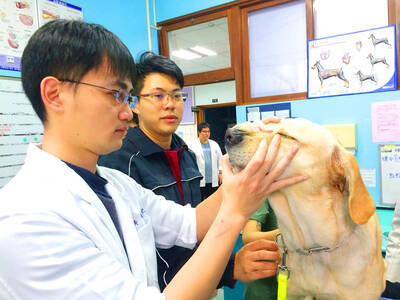Immunologist and Tang Prize laureate Marc Feldmann’s pioneering treatment has been used to tackle more than a dozen diseases, revolutionizing the pharmaceutical industry while helping millions of people, but at 76 he is showing no signs of slowing down.
In a recent interview at his home in London, the retired Oxford professor reflected on his research path and his numerous ongoing projects, crediting his seemingly inexhaustible energy to a drive to help people and do good.
After already changing the world once, he said the temptation to keep going “is very strong,” and he is optimistic that he might just be able to do it again.

Photo: CNA
Feldmann, who grew up in France and Australia, but spent most of his research career in the UK, is one of three recipients of last year’s Tang Prize in biopharmaceutical science, which he was officially awarded at a virtual ceremony last week.
The immunologist is credited with being the first to demonstrate that people with rheumatoid arthritis, a disease that causes pain and swelling in the joints, had far more pro-inflammatory cytokines than normal, and identified tumor necrosis factor (TNF) as the key cytokine.
Cytokines are a large family of proteins found in the immune system that play a crucial role in responding to infections. The primary function of TNF in particular is the regulation of immune cells.
After identifying TNF as a target, Feldmann worked with his colleagues to develop a TNF antibody to treat rheumatoid arthritis.
Today, anti-TNF treatments have become “standard therapy” for rheumatoid arthritis, as well as multiple autoimmune and inflammatory diseases, converting them from severely debilitating conditions to largely manageable diseases, the Tang Prize Foundation said in its award citation.
Feldmann said that he and his collaborators knew very quickly that the treatment they had developed was effective.
Even before receiving a full course of treatment, people in their first trial reported feeling a lot better, “and when the treatment stopped, our second-ever patient went back to playing golf,” he said.
It was an “unexpected surprise,” he said. “You often read that it takes years to find out if your medicine works; we found out that our medicine worked within two hours of starting the project.”
The discovery of anti-TNF therapy as an effective treatment not only helped those treated with the drug, it also created a lasting impact on the pharmaceutical industry as a whole, Feldmann said.
“The work we did together was the first use of a monoclonal antibody in a common disease for a long period of time,” he said.
As the number of patients who benefited from taking these types of drugs increased, and as their use in other diseases also grew, “this changed the pharmaceutical industry forever,” Feldmann said.
“Now, half of the new medicines are monoclonal antibodies,” he added.
At 76 years of age, “I am not short of ambition, but I am short of time,” Feldmann said.
During his “so-called retirement” from being a professor, as he puts it, he has set up six companies with his colleagues that focus on creating new medicines for a wide range of diseases.
These include new applications for the anti-TNF treatment, the use of synthetic cannabinoids, stem cell therapy and treatments for neurodegenerative diseases and cancer, Feldmann said.
He said he is optimistic that this “new career with friends” will give him an opportunity to “perhaps change the world again for the better.”
Although his research has been a success, Feldmann initially studied and trained to become a medical doctor, only switching to research after he began practicing.
“Within one year in the hospital, I realized that we did not have very many effective medicines, [and] it was clear that the way to develop new treatments was through research,” he said.
It was a risky decision.
Being a doctor “is a guaranteed way in every culture to make a bit of an average income and living,” he said. “Doing research is far from guaranteed.”
However, he took the risk because he knew that if his work was successful, he would be able to treat a lot of people.
Feldmann said research has also been a wonderful education, and it has allowed him to contribute to the vast expanse of human knowledge.
“It’s important to realize that the foundation of all new knowledge is research,” he said, adding that it is an endeavor that requires many people, each of whom is important to the process in different ways.

Former Czech Republic-based Taiwanese researcher Cheng Yu-chin (鄭宇欽) has been sentenced to seven years in prison on espionage-related charges, China’s Ministry of State Security announced yesterday. China said Cheng was a spy for Taiwan who “masqueraded as a professor” and that he was previously an assistant to former Cabinet secretary-general Cho Jung-tai (卓榮泰). President-elect William Lai (賴清德) on Wednesday last week announced Cho would be his premier when Lai is inaugurated next month. Today is China’s “National Security Education Day.” The Chinese ministry yesterday released a video online showing arrests over the past 10 years of people alleged to be

THE HAWAII FACTOR: While a 1965 opinion said an attack on Hawaii would not trigger Article 5, the text of the treaty suggests the state is covered, the report says NATO could be drawn into a conflict in the Taiwan Strait if Chinese forces attacked the US mainland or Hawaii, a NATO Defense College report published on Monday says. The report, written by James Lee, an assistant research fellow at Academia Sinica’s Institute of European and American Studies, states that under certain conditions a Taiwan contingency could trigger Article 5 of NATO, under which an attack against any member of the alliance is considered an attack against all members, necessitating a response. Article 6 of the North Atlantic Treaty specifies that an armed attack in the territory of any member in Europe,

LIKE FAMILY: People now treat dogs and cats as family members. They receive the same medical treatments and tests as humans do, a veterinary association official said The number of pet dogs and cats in Taiwan has officially outnumbered the number of human newborns last year, data from the Ministry of Agriculture’s pet registration information system showed. As of last year, Taiwan had 94,544 registered pet dogs and 137,652 pet cats, the data showed. By contrast, 135,571 babies were born last year. Demand for medical care for pet animals has also risen. As of Feb. 29, there were 5,773 veterinarians in Taiwan, 3,993 of whom were for pet animals, statistics from the Animal and Plant Health Inspection Agency showed. In 2022, the nation had 3,077 pediatricians. As of last

XINJIANG: Officials are conducting a report into amending an existing law or to enact a special law to prohibit goods using forced labor Taiwan is mulling an amendment prohibiting the importation of goods using forced labor, similar to the Uyghur Forced Labor Prevention Act (UFLPA) passed by the US Congress in 2021 that imposed limits on goods produced using forced labor in China’s Xinjiang region. A government official who wished to remain anonymous said yesterday that as the US customs law explicitly prohibits the importation of goods made using forced labor, in 2021 it passed the specialized UFLPA to limit the importation of cotton and other goods from China’s Xinjiang Uyghur region. Taiwan does not have the legal basis to prohibit the importation of goods